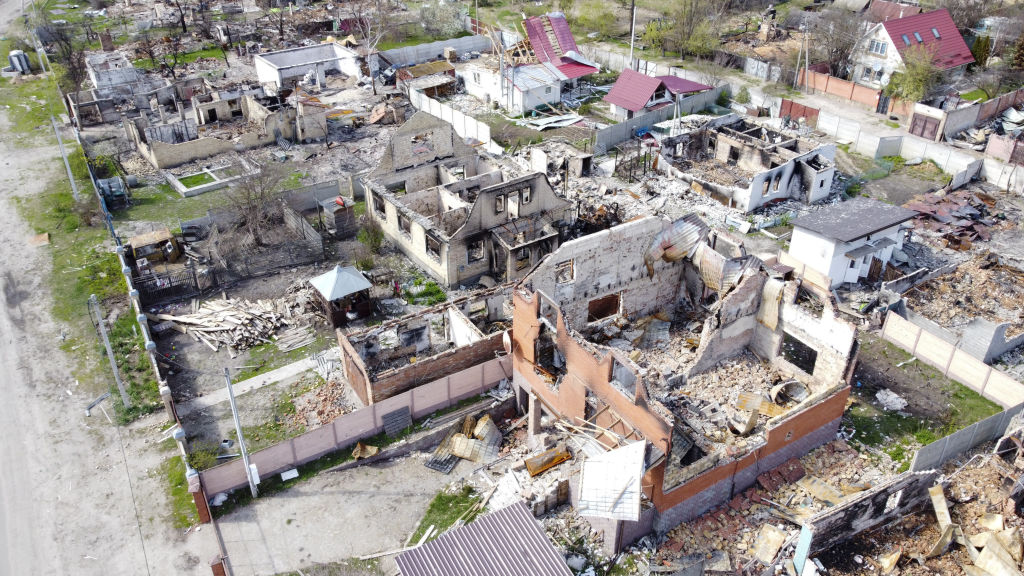Listen to article
After decades of U.S. foreign policy defined by military quagmires, public apathy, mission creep, and costly counterinsurgencies from Vietnam to Afghanistan and Iraq, the Russian invasion of Ukraine presents a morally unambiguous foreign policy challenge for the U.S. and its allies.
Ukraine, a democratic ally with a transatlantic orientation, is fighting a domestically and internationally popular defensive conventional war against Russia, a former imperial master that is attempting to deny Ukraine peoplehood and statehood and that happens to be longtime rival to the U.S. With moral indignation driving a rare bipartisan U.S. foreign policy, there is an understandable interest in winning the peace – even before there is any peace to be won in Ukraine. To do that, policymakers must carefully refine the narratives and policies of Ukrainian aid.
The scale of destruction drives the impulse to give generously. The Kyiv School of Economics estimates $500 billion in damages from Russian aggression. With the backing of Treasury Secretary Janet Yellen and Secretary of State Antony Blinken, Congress passed a bipartisan agreement that would allocate $40 billion for Ukraine. This is just the American contingent of aid, which would join the smaller EU assistance being sent to Kyiv. This is purely aid for future reconstruction, not humanitarian assistance or military aid for the current conflict.
U.S. policymakers are already discussing how to give more, with figures in the hundreds of billions being bandied about. Given what is known about foreign aid, such a massive sum amid continued fighting is counterproductive owing to the dynamics of sustained foreign aid. U.S. policy and caution are especially important as the recent visits to Kyiv by German Chancellor Olaf Scholtz, French President Emmanuel Macron, Italian Prime Minister Mario Draghi, and Romanian President Klaus Johannis suggest, Ukraine will likely receive massive and long-term assistance measured in the hundreds of billions by joining the European Union.
The sums of aid being requested are four times the size of Ukraine’s entire economy ($155 billion in 2021) and three times the total allocated in the 1948 Marshall Plan to rebuild the entirety of Western Europe after World War II ($179 billion in today’s currency). Policymakers are operating under the illusion that throwing money at problems is the best way to solve them; not only is that untrue, it is also certain to undermine Ukraine’s already difficult recovery.
The Marshall Plan was exceptional and succeeded in the face of existential Soviet pressure while outperforming the most optimistic of projections because it operated surgically. Politically conditional and targeted infusions of capital into industries, education, technology, and ministries allowed European countries to organically restart their economies.
There is a wide array of precedents we can draw on to ensure Ukraine gets the aid it needs. The global South is littered with examples of poor aid policy, with recipient economies drowned by floods of capital and goods that destroyed local economies and institutions. To avoid recent missteps driven by the moral impulse to demonstrate sympathy with more aid, U.S. policymakers must instead draw on successful examples in post-1945 Western Europe, post-1989 Eastern Europe, and East Asia and be aware of the multibillion-dollar aid failures of Vietnam, Iraq, and Afghanistan.
A Blueprint for Aid
First, donors should avoid the common pitfalls of foreign aid exacerbating corruption and patrimonial networks. This can be done by ensuring there is a requirement for open and competitive bidding processes for anything the Ukrainian government pays for with foreign aid. In the information age, the government can easily facilitate this through the creation of open, online databases. This is such a critical part of aid allocation that, if necessary, it should be supervised by third parties with no direct political stakes in aid allocation. These parties do not have to be Americans; Europeans – Poles, Czechs, Lithuanians, and others – are closer to Ukraine and intimately understand the challenges of reconstruction as well as regionally specific limitations.
In the event there are continued future financial windfalls or aid tranches that cannot be absorbed by local authorities, Ukraine must establish a sovereign wealth fund to carefully manage excess cash. Doing so will ensure sustainability for future generations, prevent graft, and signal Ukrainian responsibility to prospective investors and donors.
Aid must also be as decentralized in administration as possible. Expanding the already successful decentralizing initiatives implemented by the Ukrainian finance ministry from 2015 to 2016 beyond the banking sector to local reconstruction administrations would be most practicable. Some degree of macroeconomic coordination will require political leadership in Kyiv, but beyond those bare necessities, as much as possible should be given to and run by local authorities. Doing so will ensure more efficient and equitable distributions of aid.
Donor countries and private actors must also avoid the temptation to treat Ukraine as a convenient dumping ground for old goods. If Ukraine is flooded with cheap or free goods, the local economy will suffer, as local industries may find themselves unable to compete. The last thing Europe or Ukraine needs is to create an aid dependency trap. After immediate humanitarian crises subsist, capital aid must replace aid in kind as quickly as possible.
This replacement must be combined with allowing Ukraine to allocate said capital how it sees fit, with Western participation for audit and compliance. Still, if Ukraine receives capital aid but has its spending excessively regimented by donors, aid will not only be less effectively managed but Ukraine also will lose the opportunity to gain administrative expertise that will be invaluable for reconstruction and reforms after the war ends. Most importantly, Ukraine knows best how it should immediately spend money for its benefit. Payments can go toward food imports, balance of payments, education, technologies, etc.
The type of capital aid given to Ukraine must also be carefully calibrated. Grants must be utilized in conjunction with low-interest loans to synergistically rebuild the Ukrainian economy. Early tranches of aid should be composed of grants that will aid Ukrainian reconstruction in physically devastated areas and dilapidated industries and to jumpstart vital industries and rebuild critical infrastructure, providing Ukraine the means to stand on its own as quickly as possible.
While aid in kind and grants will inevitably be the earliest forms of aid Ukraine receives during its reconstruction, loans should eventually supplant them. The inherent conditionality of loans will stimulate responsible spending and demonstrate that Ukraine is trusted with debt, a vital component of any long-term reconstruction strategy. The availability of lines of credit supported by Western governments and backed by international financial institutions will help to ensure Ukraine’s creditworthiness and lead to future economic success.
Quickly transitioning to loans also will help make Ukrainian reconstruction a more politically sustainable project. Sunset provisions for assistance should be defined from the beginning. If endless aid and grants are sent, Western voters’ appetite for rebuilding may dry up. Loans also have the obvious benefit of being repaid, promoting Ukraine’s continued economic integration with financing countries and ensuring fairness for the taxpayers of donor countries.
Capital aid of all kinds, especially loans, can also be used to reinforce and positively condition Ukraine’s ongoing economic liberalization and reform efforts. Ukraine still has vast segments of its economy either operating like a 20th century rust belt or lingering in the shadows of a gray-market economy. The fundamental dynamics of open credit and capital mobility will force these industries to reform and ensure the commanding heights of the Ukrainian economy are in private hands.
This array of prescribed policies runs the gamut from mundane to ambitious. They do not conform to a partisan alignment or outlook. The only thing that all these policies have in common is they have historical antecedents showcasing success, can be implemented with relative ease by most governments, and can lead to economic success.
The historical examples are undeniable and stretch across time and location. The Marshall Plan is the obvious example, jump-starting not only Western Europe’s economy with targeted capital but also benefitting American firms enormously and short-circuiting domestic communist movements in Italy and France.
Reconstruction strategies in Japan, South Korea, and Taiwan showcase how responsible debt allocation to even politically dubious state actors can encourage political liberalization and economic integration so long as it is paired with consistent pro-democratic political pressure. The mixture of grants in early tranches and later low-interest loans, coupled with privatization, deregulation, and foreign investment-friendly policies is a reason why Eastern Europe is so comparatively successful among post-Communist states and how the damaging institutional legacies of 50 years of communism have been mitigated.
Moving Forward
This call for more discrete aid is not an objection to aiding Ukraine in principle. It is good policy to give Ukraine every drop of immediate military and humanitarian aid required to safeguard its sovereignty and preserve the international system. This call for surgical aid is aimed to benefit Ukraine and the constituents of donor countries alike.
While a transparent and responsible aid policy alone is not sufficient to make Ukraine a free and prosperous country, it is necessary. Even with wise foreign assistance, Ukraine will still have considerable obstacles to its development. Its institutions will have to manage reconstruction while mitigating the corruption that previously weakened the state and fortifying the rule of law, all while Russia may remain a mortal threat.
Ukrainians will have to be politically active and vigilant to avoid systemic ills that afflicted their country before the war and have not evaporated since Russia attacked. Nevertheless, addressing all these challenges is possible. Thankfully, there is a slew of tested and easily implementable policies that can be prepared and implemented. If Ukraine does not receive the intelligent, limited, and targeted reconstruction aid that has proven most effective, it may lose the peace.
Ukraine needs to be the subject of a careful, considerate, and transparent aid program, not to be crushed with pallets of cash.
Ariel Cohen, Ph.D., is a Non-Resident Senior Fellow at the Atlantic Council and Director, Energy, Growth, and Security Program at the International Tax and Investment Center. He is the author of six books and monographs, including Russian Imperialism: Development and Crisis, and over 1,000 articles. He regularly contributes to leading TV channels, including CNN, BBC, FOX, and Bloomberg, and contributes to the Wall Street Journal, Forbes, The Hill, NEWSWEEK, and other publications. Dr. Cohen is the Founding Principal of International Market Analysis.
Wesley A. Hill is the International Program Manager for the Energy, Growth, and Security Program at the International Tax and Investment Center. Wesley is a foreign policy professional and China expert, having conducted research on Authoritarian Politics, Sino-African relations, Sino-American relations, Chinese influence in Central Asia, foreign aid, and energy.
The views expressed in this article are those of the author and not an official policy or position of the New Lines Institute.






